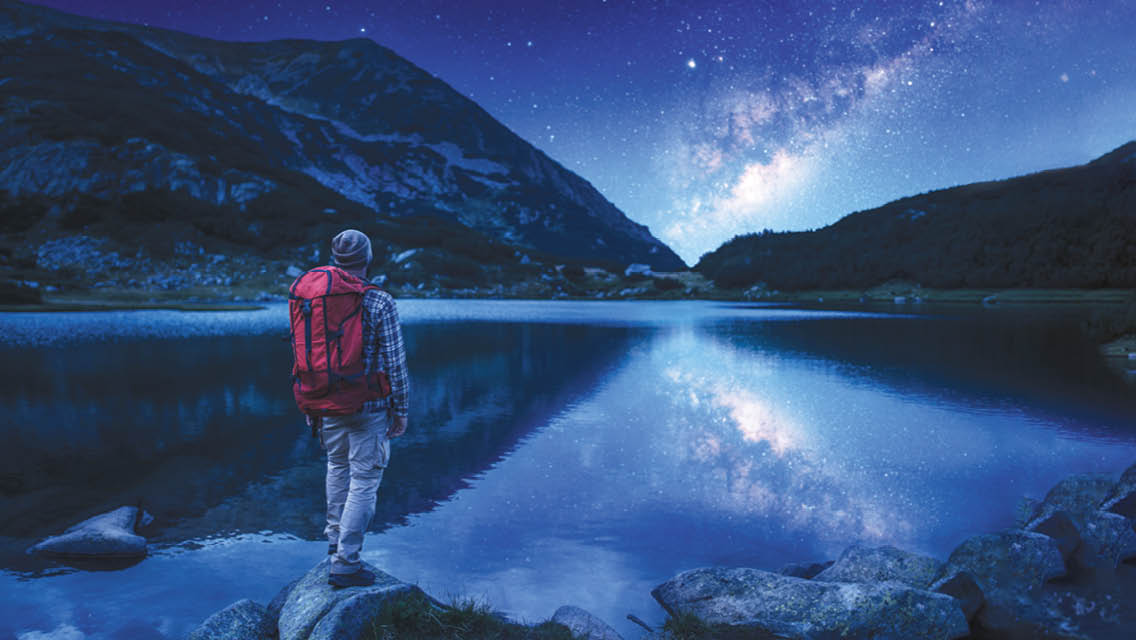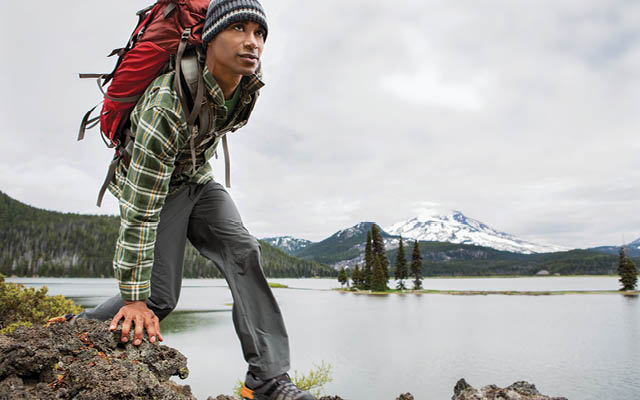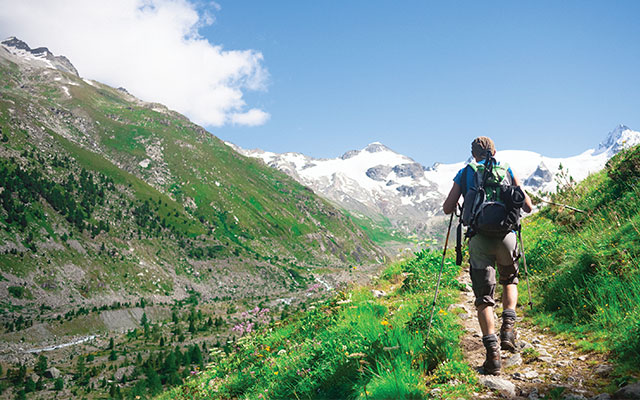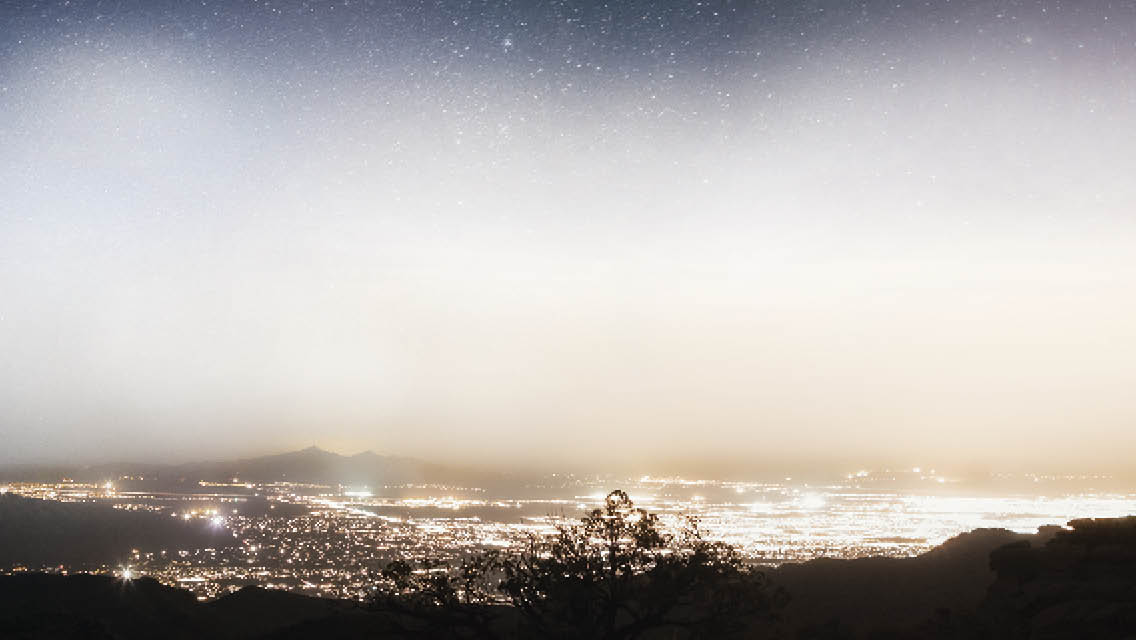Hiking is one of the most popular sports in part because of its simplicity. Hiking at night, however, takes on an entirely new dimension.
“Night hiking is about embracing the darkness and slowing down, even as excitement is amplified while hiking on a dark trail,” says Jason McEwen, backcountry guide for the group Hike for Life, which leads trips in Colorado’s Pikes Peak region. “While it can be a wonderful experience, it is a rigorous mental challenge that requires you to step out of your comfort zone and change some things about the way you hike.”
Nighttime requires a new perspective on hiking even for the most seasoned trail veterans. Your senses are heightened, your awareness is increased, and your heart rate rises. With no distant vistas on which to focus, you’re more likely to hear sounds you’d miss during the day.
“Night hiking is unique because you experience nature differently,” says Jordan Hoffman, an avid night hiker. “The world feels limited to where your cone of light can reach or the moonlight has illuminated. The lack of resolution of your surroundings makes movement feel faster, and your ears strain to pick up more clues.”
During the day, a squirrel running in the bush is simply a squirrel running in the bush. But at night, says McEwen, the sound “will stop you in your tracks. You will question your every decision as you wonder what that noise was — it’s exciting.”
Then there’s the solitude and the beauty of the night sky. “Hiking at night is a sure-fire way to avoid crowded trails,” says Mallory Moskowitz, owner of Your Adventure Coach, who offers hiking advice and resources. “And it’s the perfect time to observe the night sky, catch a scenic moonrise, or try to photograph the stars and Milky Way.”
Night hiking also opens up opportunities for people with a nontraditional schedule.
Preparation, experts agree, is the key to a successful night hike. If you plan ahead and take necessary precautions, a night hike can be a beautiful way to broaden your horizons, challenge your preconceived notions of your capabilities, and help you build confidence and calm in the face of uncertainty — and even fear.
Inspired to take a night hike? These tips can help you stay safe, feel confident, and make the most of your nocturnal adventure.
Night-Hiking Tips
1. Prepare your supplies in advance. Pack everything you would use during a day hike in your specific region and season: ample water, bug spray, special clothing and extra layers, and adequate fuel and nutrition. Also bring multiple light sources, including at least one headlamp. The best ones for night hiking feature red lights, which aid night vision. Some also boast taillights and variable brightness. Additionally, always carry a flashlight and spare batteries.
2. Study the trail. “I tend to err on the side of caution while night hiking,” says Moskowitz, “and purposefully choose slightly easier trails that are well marked or well traveled so that I don’t have to worry as much about route-finding in the dark — which can be much more difficult than in the broad daylight.”
Hoffman concurs. “Night hiking is not the time to push limits on new terrain,” he says. “You might miss a turn or get caught in a weather system and have less safety margin than you otherwise would during a daylight hike.” Even if you’re familiar with the park or trail, double-check the local rules before heading out. Some areas close their gates at night, which means all cars must be clear from trailheads at dusk.
3. Buddy up. Embarking on a night hike with a friend, family member, or even a guided group has several perks. For one, sharing this unique adventure can heighten the experience and make it more fun. Plus, there’s safety in numbers, should an emergency arise.
Whether you choose to go solo or head out with a pal, make sure you tell someone who is not on the hike exactly where you’re going and about how long you’ll be gone. And plan to check in with them when you return.
4. Slow down. Arrive at the trail 10 to 20 minutes early and take a seat at the trailhead. Allow your eyes to adjust to the darkness of the trail — and allow your body to adjust, too. Be ready to hike at a slower speed, even on a familiar trail, advises McEwen. Be mindful of footing and trail edges as you move. Remember, while day hikes may be about reaching the summit, night hikes are about the experience of the journey, not the destination. And it’s OK to turn back early.
5. Respect the wildlife. “More animal activity happens at night,” explains Hoffman. Depending on the region and season, “herds of deer and elk make movements, ground-dwelling mammals come out to forage, and predators such as mountain lions and coyotes come out to hunt.”
Proximity to these animals and others is part of the magic of hiking at night — and it’s important to remember that you are entering their domain. Do so with respect, giving any animals you encounter a wide berth. Making noise as you move (by carrying a bell, for instance) can help ensure a safe distance. If you plan to hike with any pets, Moskowitz advises keeping them leashed.
6. Take pleasure in a rest break. “I like to hike out to a certain spot, overlook, or summit and then just sit with my headlamp off,” says Moskowitz. “There’s a sense of peace and reassurance in just sitting in the dark, without any lights or screens on, admiring the stars.”
This article originally appeared as “Hello, Darkness” in the April 2022 issue of Experience Life.





This Post Has 0 Comments